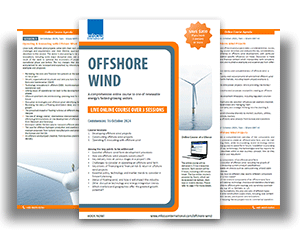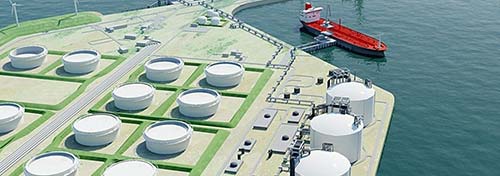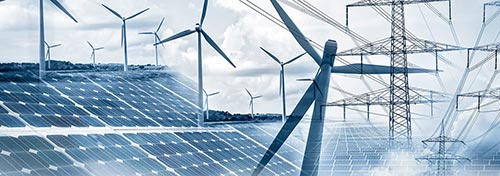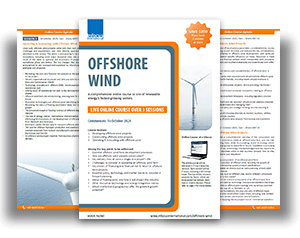Offshore Wind (Online Course)
WHEN
Upon Request
WHERE
Live Online Course/
In-Person
Overview
A comprehensive online course to one of renewable energy’s fastest-growing sectors
A business-focused training designed to provide business developers and investors with an accessible, concise, and comprehensive understanding of the processes and risks involved in creating these capital-intensive and lengthy projects.
Offshore wind projects differ from their onshore cousins, both in terms of the components required and the project development and installation processes involved. From turbines and timescales to cabling and costs, the scales are often supersized – with clear economic and practical rationale for this.
This course leads attendees through the processes, technologies and financial return and risk considerations for those involved in offshore wind project development. Explanations are provided in clear, business-friendly language accessible to non-engineers. Trends and emerging disruptive technologies, such as floating turbines and integrations with other clean energy solutions, are introduced and placed into context.
If you need a valuable, up-to-the-minute and independent introduction to the fast-growing offshore wind sector, this online course provides the perfect learning opportunity.
Among the key points to be addressed
- Essential offshore wind farm development processes
- How are offshore wind projects constructed?
- Key delivery risks at various stages in a project’s life
- Challenges to consider in operating an offshore wind farm
- Key drivers of financing and financial risk & return in offshore wind projects
- Essential policy, technology and market trends to consider in forward planning
- Status of floating wind, and how it will impact the industry
- Other disruptive technology and energy integration trends
- Which markets and geographies offer the greatest growth potential?
Live Online Course – How It Works
The structure of our virtual learning program is designed to keep the same levels of engagement and networking as our on-site public courses. Course content is delivered through our easy-to-use online learning platform and is supplemented by case studies and practical exercises.
Like our classroom-based public courses, you will have live interaction with our course facilitators and other participants. Our live online courses are led by our experienced instructors, who will provide you with easily digestible content, using knowledge learned from many years in the industry, during scheduled times. Delegates will receive copies of the course materials electronically.
This course is scheduled to take place over 3 live online sessions using virtual learning technology.
Course Agenda
Session 1
Developing offshore wind projects
- The costs, resource metrics and competitiveness of offshore wind: a review of the data
- Identifying other policy and socioeconomic drivers behind offshore wind
- Offshore wind growth markets, including recent project examples & licensing plans
- Financing offshore wind power projects: who is providing the money? (with examples)
- Summarising the end-to-end processes involved in creating an offshore wind farm
- Realistic project development timescales, including regulatory environment influences
- Resource assessment and site selection influences (an example checklist)
- Identifying key stakeholders and managing them
- Incorporating uncertainty and strategic thinking into the planning & permitting process
- Selling offshore wind (choosing channels to market): auctions, utilities, corporates & electricity markets
- Illustrations using offshore wind projects from Europe and elsewhere
Session 2
Constructing offshore wind projects
- Reviewing the key components of an offshore wind farm
- Key trends in the evolution of offshore wind, including the growth of 10MW+ turbines (reviewing current product specifications)
- Site condition impacts on choices such as cable planning, project scale and component choices
- Depth and distance: how do different sites lead to different component choices and construction needs?
- The importance of the onshore components of an offshore wind farm
- Inter-array & export cabling: technology choices and installation challenges
- Different approaches to offshore grid topology and ownership (contrasting nearby markets, e.g. UK vs. Germany vs. US)
- Options for turbine foundations: the pros and cons of different types
- Creating offshore wind construction supply chain, including local content
- Offshore installation vessels, pinch-points and innovations
- Summarising and mapping the key project risks to commercial operation date (COD)
Session 3
Operating & innovating with offshore wind
- Reviewing the costs and financial risks present at the operational phase of the project
- Vessels, organisational structures and best practices for efficient operations and maintenance (O&M)
- Technology innovations in offshore O&M: recent examples which lower operational cost
- Linking issues of operational risk back to the development & construction phases
- Offshore wind farm decommissioning: planning now for the process in future
- Disruptive technologies and offshore wind: identifying the ones to watch
- Reviewing the status of floating wind (latest data), and the barriers to growth
- The projected impact of floating turbines at different stages of the project lifecycle
- The role of ‘energy islands’, international interconnectors and other offshore grid innovations on the development of offshore wind (examples from Denmark and Germany)
- Are export cables the best way to transport offshore wind energy?
- The case for offshore hydrogen production and pipeline export (including example proposals from turbine manufacturers and project developers in the Europe and the US)
- An offshore wind project checklist, from business planning to practical delivery
Training Methodology
The course combines presented materials with plenty of opportunity for Q&A, interactive discussions, and the use of quantitative models to illustrate key learning points. Current market examples and data are utilised wherever helpful.

Pre-Course Questionnaire
We would like to customise the workshop based on your specific needs. Pre-Course Questionnaire will be sent prior to the workshop for analyse in advance and to be addressed during the course.

Course Certificate
Upon the successful completion of this course, you will receive a Certificate of Completion bearing the signatures from both the Course Director and the Course Organiser. This Certificate will testify your endeavour and serve towards your professional advancement.
Who Will Attend
- Renewable power project developers
- Power plant owners and operators (utilities and IPPs)
- Transmission/Distribution system operators
- Policymakers and policy advisors
- Investors, including commercial and development banks, venture capital and private equity
- Vendors & EPC contractors
- Large energy users
- Commercial energy-sector services suppliers (law, insurance etc.)
You Might Also Be Interested In
EPC Contracts for Energy Industry (Online Course)
A comprehensive analysis of EPC contracts and of the key considerations in projects and disputes where such contracts are used
Option 1: 4, 5, 6, 11, 12 March 2025
Option 2: 1, 2, 3, 8, 9 July 2025
Carbon Capture, Utilisation & Storage (Online Course)
Master the technology pathways, its business drivers, economics and deployment strategies
Option 1: 13, 18, 19, 20 March 2025
Option 2: 10, 12, 13, 14 November 2025
LNG: Supply, Demand, Pricing and Trading (Online Course)
An overview of the LNG business in 2025 with a commercial focus but technology and shipping will also be covered.
Option 1: 18, 20, 24, 25, 26, 27 March 2025
Option 2: 9, 10, 11, 15, 17, 18 September 2025
Electricity Economics in Changing Electricity Markets (Online Course)
The new economics of power markets in a low-carbon world
Dates: 14, 15, 16, 19 May 2025
Renewable Energy Power Purchase Agreements (Online Course)
Practical models and techniques for analyzing & structuring, drafting, and negotiating Renewable Energy PPAs for bankable green investments in today’s competitive energy markets
Dates: 15, 17, 18, 23, 25 September 2025
Mastering Solar Power (Online Course)
Building solar power into clean, modern & flexible power systems











